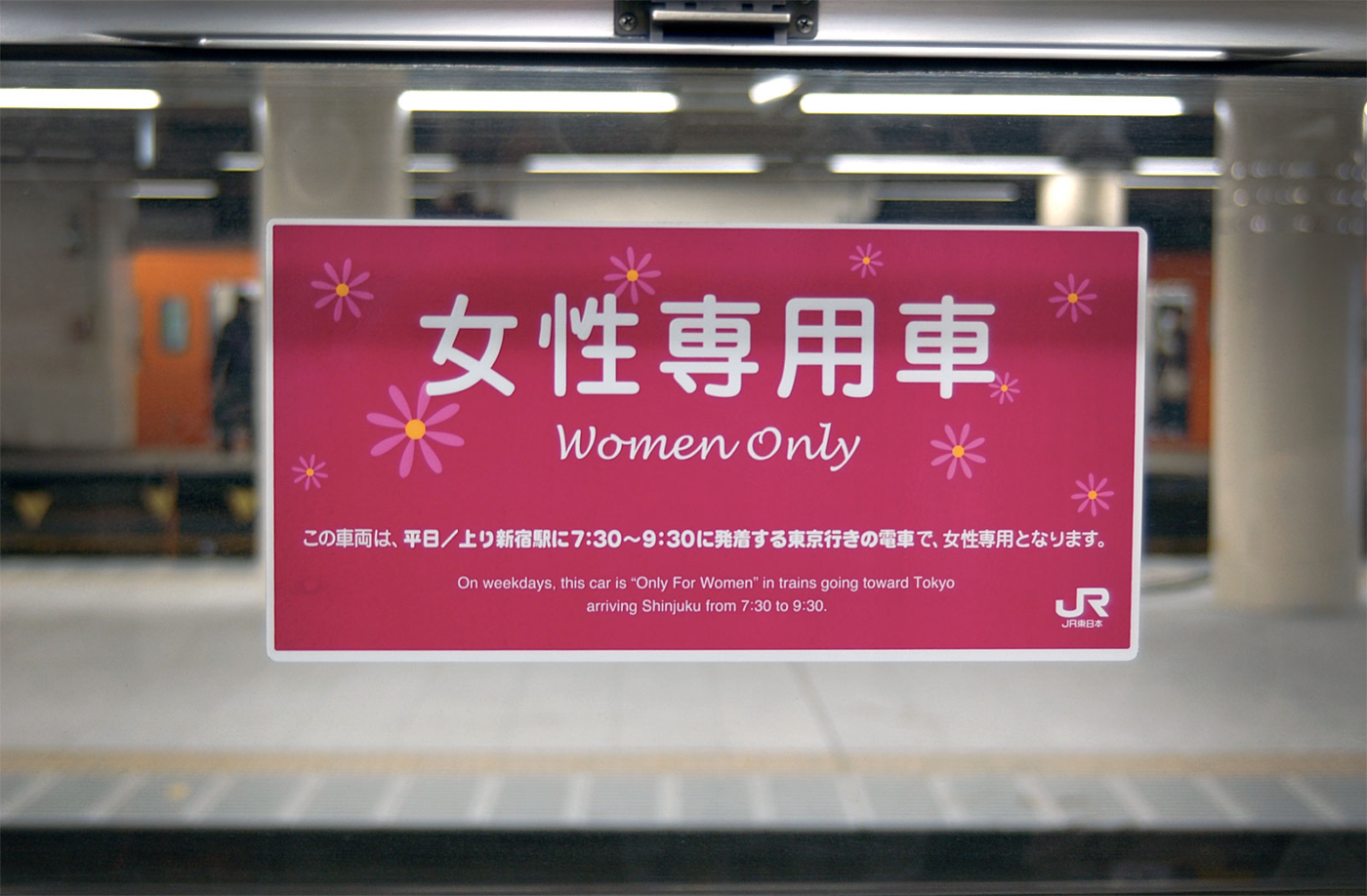You’re on a crowded train with less than a centimeter of space between you and the people around you. You feel suffocated by the sea of heads millimeters away from yours. There’s only a few minutes until the train stops at your station. All of a sudden you feel a trail of hands going up your thighs. You squirm and look back. It’s a man you don’t know. Do you tell him to stop? Do you scream? Or should you just wait for him to stop to avoid trouble? This is the decision many women in Japan have to make. According to Japan Today, surveys conducted by train companies show that about 70% of young women have experienced chikan, meaning public molestation, at some point their lives.
70% of young women have experienced chikan, meaning public molestation, at some point their lives
Would you feel comfortable going on a train again after encountering that experience? In response to this growing problem, Japanese transportation systems have created women-only carriages on many of their trains. A spokeswoman for the Tokyo Metropolitan Government explained that these carriages were meant to give women on the train a “peace of mind”. Given that the “women only” rule is typically only enforced early in the morning and on several carriages per train, they seem unproblematic. However, it has caused quite a lot of controversy.
Groups of men are boarding these women-only carriages as a form of protest against “discrimination”. They argue that false accusations can ruin the lives of these men as they can lose their jobs. In a country where the conviction rate is 99%, the scare around false accusations have increased to the point where there are insurances for legal finances on sexual molestation cases. Women-only carriages can actually help address this issue. These carriages don’t just protect women from molestation but they also protect men from potential false accusations.
Another argument made against these carriages are for its lack of practicality and failure to address the heart of the issue. During rush hour, the separation is simply not practical. You also have to ask, is segregating men and women really a solution to sexual violence? Aren’t these carriages insulting because they imply the problem is inevitable? However, if you were in the situation and you were molested, it doesn’t matter whether these women-only carriages solve the problem of sexual assault. These carriages could possibly be an escape from what you’ve experienced and something that could make you feel safe the next time you are on a train. Nearly 70% of women in Tokyo support these carriages. Though they may not be completely solving the problem, it is helping and that should be enough to implement these changes.
If you were in the situation and you were molested, it doesn’t matter whether these women-only carriages solve the problem of sexual assault. These carriages could possibly be an escape from what you’ve experienced and something that could make you feel safe the next time you are on a train.
Going back to the example, if you were the victim, you may struggle with PTSD or depression for the rest of your life. This one incident could cause consistent flashbacks and suicidal thoughts every time you ride a train. What if there was a place you can escape to for some peace? Finding a long term solution that targets the views which cause chikan is very necessary. Before we can find this solution, women-only carriages are effective and simple measures that can be easily taken for the safety and comfort of everyone. If it was you, wouldn’t you want a place to feel safe?
あなたは窒息しそうなくらい混んでいる満員電車に乗っています。降りる駅まではあと数分。突然、あなたは誰かに太ももを触さわられ、その手の方向を見ると見ず知らずの男がいました。これが痴漢です。
彼に止めるよう言いますか?悲鳴をあげる?それとも黙って我慢して彼が止めるのを待ち、トラブルを避けますか?日本の鉄道会社が実施した調査によると約70%の若い女性は痴漢にあったことがあるという結果があります。これは多くの日本女性は痴漢に遭った際にどうするかの選択を迫られているということ。
痴漢に遭った電車にまた乗りたいとあなたは思えますか?この問題に対応した日本の鉄道各社は、多くの電車に女性専用車両を取り入れました。東京都の広報はこれらの車両は女性に電車内での「安心」をもたらすためのものであると説明しています。一見、「女性のみ」の車両が、通常混雑する早朝のみ適用され問題はなく思えますが、このシステムは多くの論争を巻き起こしました。
女性専用車両を「差別」だと抗議する男性グループは、その抗議活動の一貫として女性専用車両に乗り込みました。彼らは痴漢冤罪や濡れ衣は彼らの仕事を奪い、人生を台なしにすることができると主張します。有罪判決率99%のこの国では、痴漢事件の弁護士費用保険があるほどに、冤罪や濡れ衣への恐怖が高まっていれのも事実です。ただ、女性専用車両は女性を痴漢から守るだけでなく、冤罪被害から男性を守ることもできるともいえますが。
女性専用車両に対して起きた別の議論は、混雑した時間での分離が難しいと思われ、実用性に欠けるということや痴漢問題の核心には対処できてないというもの。
そしてまず考えなくてはいけないことは、男性と女性を分離することを性的暴力の解決策として良いのでしょうか?女性専用車両という存在は、痴漢や性的暴力という犯罪はどこかで必ず起きると暗示されている気がして不快にはなりませんか?
とはいえ、あなたが痴漢被害者になったときに、女性専用車両がその犯罪の解決になるかはわかりませんが、その存在はあなたが次に電車に乗る際に安全に感じることが出来て、嫌な思い出を少し軽減させるかもしれません。
東京の女性のほぼ70%が女性専用車両を支持しています。問題解決に十分ではなくても、彼女たちを助けるのには十分です。
話を戻すと、痴漢被害者はそのせいでうつ病やPTSDに苦しめられる人生を送る可能性があります。ただ一度の事件でも、電車に乗るたびにフラッシュバックを起こし自殺まで考えてしまうことすらあるのです。そこから逃げることができる、安全な場所があるなら痴漢を無くすための解決法を探ることは重要です。決定的な解決法がなかなか見つからないなら女性専用車両は男女関係なく安全と快適さを得ることができる効果的で簡単な方法と言えます。あなたは心から安心できる場所が欲しいと思いませんか。
